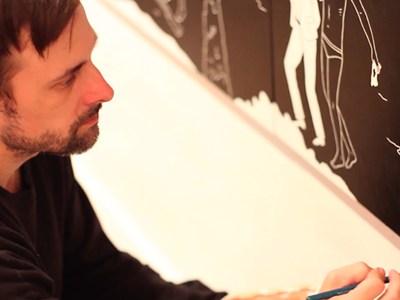Carhartt — a family-owned workwear brand founded in 1889 and currently based in Dearborn — opened its first Detroit flagship store in the trendy Cass Corridor last week. Its choice of location in a long-abandoned building on the outskirts of Wayne State University's campus posed an interesting question: Is Carhartt targeting its wares to the scores of construction crews currently at work on the M-1 Rail, or 20-something Midtown hipsters?
Perhaps the better question is: Why can't it be both? As with its other retail stores, Detroit's shop features a program designed to help outfit local work crews. "It's something we do in every market we're in, because the core of who we are is to outfit people who do hard work, and that's what we built the product for," says Tony Ambroza, Carhartt's senior vice president of marketing. Of course, if civilians want to appropriate Carhartt's heavy-duty overalls and dungarees in the name of fashion, that's fine by Ambroza too.
"It's the idea that a lot of people may have grown up in a blue-collar family still have those values, and they have the belief in the rewards of hard work," Ambroza says. "Or maybe on the weekend you enjoy spending time in the outdoors and doing things like that. We absolutely appreciate those folks, and we want to make sure they feel welcome to the brand too."
As Ambroza notes, everything Carhartt sells is purpose-built. "[CEO] Mark Valade's done a really good job of continuing [founder] Hamilton Carhartt's vision, which was always around the idea that it has to have the utility and functionality to perform on job sites," Ambroza says.
As for the Midtown location, Ambroza says a confluence of factors led to the decision including foot traffic. But in a nod to Carhartt's utilitarian demographic, the building features a valuable commodity in Midtown: a parking garage. "We know that our core consumer, if they're driving in or driving out, they want a place to park their truck," Ambroza says.
Carhartt's range of items include heavy-duty jackets, overalls, hats, and boots. Think of the typical outdoorsy color palette: dark greens, browns, camouflage, but also some hunter-ready fluorescent orange. You'll also find smaller items like flasks, socks, and wallets. Prices range from a $12 hat to $175 boots.
Ambroza points out that the company has been expanding its line of products to accommodate a variety of consumers. He says that though the company was praised for the durability of its garments, some consumers said they wished there was a way to make them more form-fitting or flexible. That's when Carhartt introduced its "Full-Swing" line. "That looks like traditional Carhartt, but on the inside of it there's a lot of stretch and ease of movement, so we've been able to make it a little closer to the body," Ambroza says. "We have a lot of folks out there who say, 'I'd really like the product not to be so big,' yet they want it to be just as long-lasting, because that's the big value. Buy a Carhartt, you're gonna wear it for a long time."







